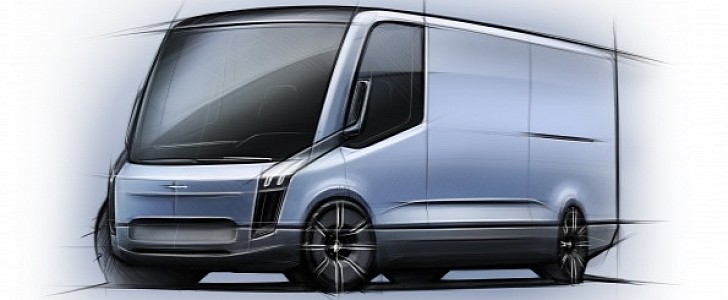UK-based Watt Electrical Vehicle Company (WEVC) announced today, August 11th, new plans to build up to 5,000 new electric vans, trucks, and buses each year starting with 2023 at a new facility in the Midlands. All the vehicles will be based on its EV platform called PACES.
It stands for Passenger And Commercial EV Skateboard, and the company claims its flexible architecture will help the commercial EV sector tackle the challenges of moving to an electric future by providing a cost-effective platform "off-the-shelf."
We've seen the platform before on a Porsche 356-inspired electric sports car that WEVC presented earlier this year. The first production car to use PACES, the Coupe, features a 40 kWh battery structurally integrated into the chassis and a mid-mounted 120 kW electric motor.
The sports car has already completed more than 12-months of testing and has since followed developments accordingly. Now, WEVC has greater ambitions and plans to implement its platform on commercial electric vehicles.
According to the company, PACES can be fitted on different body styles, sizes, and configurations and is able to support any low-to-medium volume manufacturer, specialist vehicle converter, or start-up. Its cell-to-chassis method eliminates the need for a separate battery pack by fitting the batteries directly to the primary structure. This way, it can minimize weight and stiffness.
In the last two years, WEVC has gone through an extensive development process with PACES and is now ready for market. According to the UK firm, the platform is capable of providing the foundation for any sort of commercial vehicle, including vans, trucks, and buses. It also complies with ISO rules and European Small Series Type Approval safety standards.
Production of PACES-based all-new electric commercial vehicles is slated for 2023 in the Midlands. The company also plans to reveal a first prototype electric commercial vehicle, based on its EV platform, by the end of the first quarter of 2022.
We've seen the platform before on a Porsche 356-inspired electric sports car that WEVC presented earlier this year. The first production car to use PACES, the Coupe, features a 40 kWh battery structurally integrated into the chassis and a mid-mounted 120 kW electric motor.
The sports car has already completed more than 12-months of testing and has since followed developments accordingly. Now, WEVC has greater ambitions and plans to implement its platform on commercial electric vehicles.
According to the company, PACES can be fitted on different body styles, sizes, and configurations and is able to support any low-to-medium volume manufacturer, specialist vehicle converter, or start-up. Its cell-to-chassis method eliminates the need for a separate battery pack by fitting the batteries directly to the primary structure. This way, it can minimize weight and stiffness.
In the last two years, WEVC has gone through an extensive development process with PACES and is now ready for market. According to the UK firm, the platform is capable of providing the foundation for any sort of commercial vehicle, including vans, trucks, and buses. It also complies with ISO rules and European Small Series Type Approval safety standards.
Production of PACES-based all-new electric commercial vehicles is slated for 2023 in the Midlands. The company also plans to reveal a first prototype electric commercial vehicle, based on its EV platform, by the end of the first quarter of 2022.













